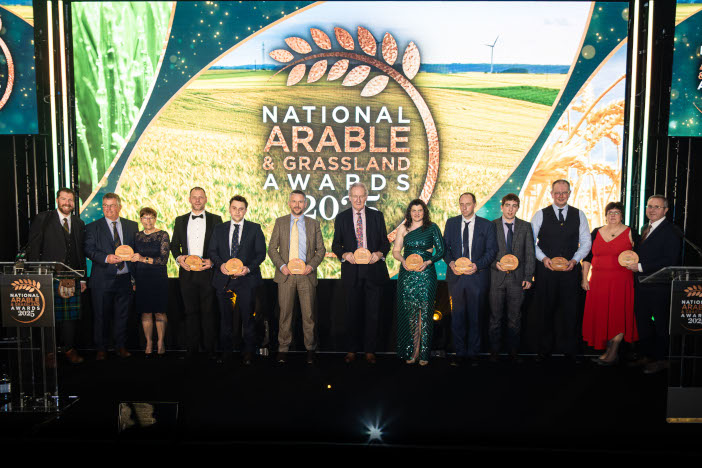On the 13th of February, the industry came together to celebrate the very best working in agriculture at the National Arable and Grassland Awards (NAGA).
The event was held at the Hilton London Bankside Hotel, where hundreds of guests enjoyed a three-course meal and entertainment from farmer and comedian Jim Smith. It was then time to celebrate the work of the farmers, contractors and agronomists who have excelled in their fields.
NAGA is organised by Farm Contractor & Large Scale Farmer and Agronomist & Arable Farmer, in association with the National Association of Agricultural Contractors (NAAC) and BASIS. The awards are in their third year and are sponsored by key companies within the industry. Our thanks to our principal sponsors Barclays and Propel Finance.
And the winners are…
Agronomist of the Year
Kathryn Ann Styan, of Agrii, was named Agronomist of the Year. Kathryn describes agriculture as a “turbulent” sector, and much of her focus has been protecting her clients from volatility.
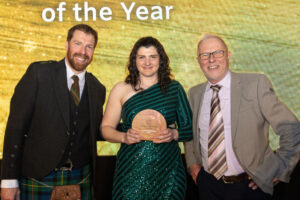
She is making good use of the technical advances in ag, with the most recent tool in her armoury being a drone. This is used to scout fields at varying levels, from checking stubble for spraying off, to detecting early disease outbreaks in salad onion crops.
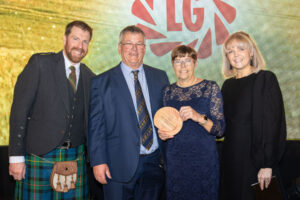
Cereal Grower of the Year – sponsored by Limagrain UK
The Cereal Grower of the Year Award was given to Richard and Lyn Anthony at R&L Anthony. The Anthonys are proof that crop performance can be maintained while building a sustainable business. The five-year winter wheat yield average is 10.2t/ha for a farm that sequesters about 60,000t of carbon a year.
The environment, soil health and conservation are important to the family, but so too is farming. The system has created habitats and corridors for wildlife that benefit the farm. Allowing beneficials to thrive in combination with changes to the farming system has reduced insecticide and fungicide use, and improved soil health.
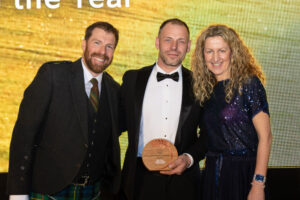
Contractor of the Year
Neil Fell was named Contractor of the Year. Based in County Durham, Neil Fell set up his sheep dipping business in 2013 and treated 2,500 sheep across five farms. Just over a decade later, the business has expanded into a national enterprise with half a million sheep dipped and units working in the Outer Hebrides and as far south as Devon and Cornwall.
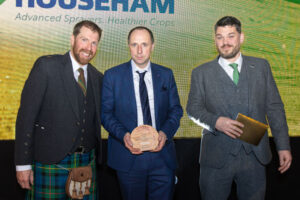
Farm Manager of the Year – sponsored by Househam
The Farm Manager of the Year was given to Simon Andrews. Porchester Farms was already a successful enterprise before Simon took over farm management responsibilities, but he has built on its success. He’s done that by adding value across the business.
One of Simon’s first tasks was to turn around an underperforming sheep flock. He changed the breed to one that suits the grassland available and converted to an outdoor lambing system, reducing the requirements for labour, feed and bedding.
Moving to milling wheats and cereal seed crops has improved returns, as has a move away from deep, power-hungry cultivations to more direct drilling.
Yields on the arable land have improved through a wider rotation and different establishment techniques. Extending the area of temporary grass for haylage and hay production has helped cut a significant blackgrass problem.
Selling carbon to Agreena and a private biodiversity net gain agreement has added further revenue streams.
The estate is in an area of outstanding natural beauty and the management team is keen to protect local wildlife. Simon is now starting an ambitious new Higher-Tier and Sustainable Farming Incentive combination, a separate Mid-Tier scheme on a permanent pasture parcel and a Higher-Tier scheme at a contract farm.
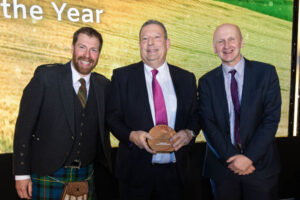
Fruit Grower of the Year & Grower of the Year
Hunter Hall Partnership took home both the Fruit Grower of the Year and the overall Grower of the Year awards. Operating across three farms in Berkshire and Surrey, Hall Hunter grows 330ha of berries, producing 6,000t of strawberries, 1,000t of raspberries, 2,000t of blueberries, as well as blackberries.
The company is constantly looking ahead, with a 0.5ha trial plot to stay at the forefront of new varieties, and a new 55ha site that will be converted to blueberry production with automated harvesting.
Integrated pest management is used to minimise the reliance on chemical controls. Pest populations are regularly monitored and handled with biological solutions where possible, including introducing predatory insects. For both biodiversity and to maintain a population of beneficials, field edges have been sown with wildflower mixes.

In 2024, Hall Hunter invested in UV treatment on 10ha of strawberries, reducing pesticide use by 59%, with plans to increase this to 60ha by 2027.
Attention has also been paid to variety, with the company looking to introduce resistant plants that require less pesticides. More than 30 varieties are currently being trialled, with a plan to phase out less-hardy varieties.
Soft berries, except for red currants, are grown in renewable substrate to provide greater control over growing conditions. After harvest, fields are subsoiled to improve root and water infiltration; this is done in combination with a series of water management and erosion reduction measures, including French drains, grass margins, buffer strips and beetle banks.
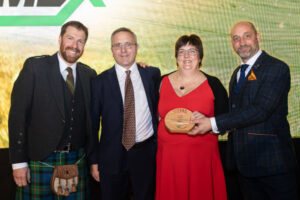
Grassland Manager of the Year – sponsored by OMEX
Andrew and Claire Brewer were announced as the Grassland Manager of the Year winners. FG Brewer encompasses just over 400ha of Cornish farmland, with a focus on dairy production from a 450- to 500-head Jersey-cross herd. Milk yields have reached 6,500 litres on a pasture-based system, with beef calves also finished on grass.
The grassland is a major part of the farm’s plan to build a circular economy. Compost is produced on the farm from treated bedding, which not only reduces ammonia losses, but also unlocks insoluble phosphorus, making it available to grasses when applied. Yield analysis suggests that fields getting a compost application outperformed untreated pasture by 30kg DM/day.
The treated bedding also improves the application of slurry, with the reduction in ammonia levels leading to a noticeable easing of the smell. The combination of compost and slurry, alongside lime, gypsum, salt and some digestate from a local biogas plant, mean the farm does not buy any bagged nitrogen, phosphate or potash.
Careful attention is paid to grazing levels to ensure that fields remain in peak condition, while cattle get all the nutrients they need. Training of the six full-time operators includes recognising easy indicators for this.
Grassland is also recognised for its role in sequestering carbon, with the hope that carbon credits could be used either as additional income or to offset operations on the farm.
According to soil sampling on a 2ha basis, the Brewers have achieved sequestration of 25-100t of carbon dioxide equivalent/ha on grassland.
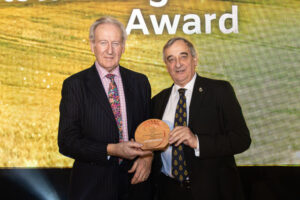
Outstanding Achievement Award
Having held a number of prominent roles in British farming, there are few people who have done as much for the industry as Lord Curry. The son of a farmer, he is perhaps best known for chairing the Policy Commission on the Future of Farming and Food following the foot and mouth epidemic in 2001.
Known colloquially as The Curry Report, it called for more funding to be put into the sector, describing practises at the time ‘unsustainable’ and arguing for cash support for environmental protection, making it a ‘selling point, not a sore point’. More than two decades later, we can see how these findings continue to shape agricultural policy. He would then lead an independent Implementation Group to act as a driver for policy changes including the 2003 CAP reforms and the establishment of the Single Payment Scheme, as well as the introduction of the Environmental Stewardship scheme.
His work in the industry started long before that, however. He was chairman of the Meat and Livestock Commission during the 1996 BSE outbreak and would be knighted in 2001 for services to the meat and livestock industries.
Even when not front and centre, he has continued to be heavily involved in the sector, from his time as chair of NFU Mutual in the early 2000s, to various roles as trustee at Rothamsted Research, chair of the Waitrose Farm, vice president of RABI, and chair of the Better Regulation Executive – a broader role which saw examine the implementation of business regulations in the UK.
Lord Curry has been a crossbench peer in the House of Lords since 2011, sitting on various committees, most recently the Horticultural Sector Committee and the Land Use in England Committee. He was also involved in the Application of Science report, which examined why UK agriculture productivity has lagged behind other nations and put forward recommendations to deliver scientific advancements that would help to tackle food security.
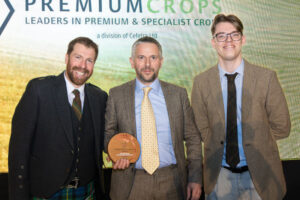
Oilseed Grower of the Year – sponsored by Premium Crops
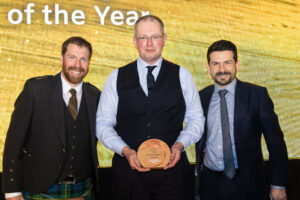
Protein Crop Grower of the Year
The Protein Crop Grower of the Year award went to Guy Prudum. Spring beans are fed back into the Prudom beef finishing enterprise, making up part of a wide rotation that also consists of two wheats, oilseed rape and spring and winter barley. About 25ha of Lynx spring beans was grown for the 2024 harvest, with Vespa as a winter variety.
Beans are established with a Mzuri strip-till drill and wholecropped at 40% dry matter to be mixed into the total mixed ration for weaned and finishing cattle. Extra protein comes from red clover leys, which are sown to tackle grassweeds and revitalise fields, and then ensiled to be fed over winter.
The crop was introduced as a way for the farm to reduce its reliance on imported soya. Beans were initially fed alongside 1kg a head/day of soya, with crimped barley and silage. However, by completely removing soya from the ration, the farm has not only seen a reduction in costs (up to 37p a head/day) but also a cut in its carbon footprint. On a whole-farm basis, the business’ footprint is 25kg carbon dioxide equivalent/kg of meat produced.
This has been achieved while still meeting the requirements of the end market, with 90% of finished beef cattle hitting the correct grade and 95% meeting the weight specifications at slaughter.
P Prudom and Son was farming organically when it added beans to the rotation, but now farms conventionally. Still, no insecticides are used in the bean crops and fungicides are omitted in low-pressure situations. The farm also uses the break crop as an opportunity to tackle grassweeds with chemistry not available to them in other crops. Some broad-leaved species, such as field pansies and speedwell, are allowed to establish in low levels to boost biodiversity.
Wholecropping means weeds and their seeds are transported off the field, leaving a clean seedbed for the next crop. The earlier harvesting date means the worst of the weather is avoided as well. For plant health, 2.5t/ha of gypsum is applied before planting, with phosphate and potash added during the growing season using variable-rate technology, based on soil testing.
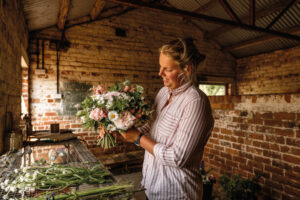
Sustainable Farming Award – sponsored by QLF Agronomy
Showing that a small scale isn’t a barrier to sustainability, winner Ellen Firth is 20 years old and runs North Wales-based business Firth Flock Flowers, alongside a flock of Black Welsh Mountain pedigree sheep. Using just over 3ha, Ellen has created a circular business where every part feeds into the next.
Flowers are established using the no-dig method and nurtured without any chemical inputs. Manure from the sheep is used to provide nutrients and the wool is used for mulching, while rare-breed Welsh Harlequin ducks and guinea fowl handle pests within the crop. Companion planting helps to minimise weed pressure. By not turning the soil, Ellen’s cropping area also acts as a carbon sink.
Away from the growing, the business is built around locally sourced materials and minimising the impact on the environment. No floral foam is used, vases for the arrangements are purchased from a local potter to order and all the packaging is compostable.
Any green waste produced on site is composted and used to feed the next crop. To encourage customers to not throw materials away, Ellen also offers a discount system for returned jars and vases.
To create income streams from the flock of sheep, surplus lamb is sold to four local restaurants and any breeding stock are sold into other pedigree flocks.
Breeding her own replacements, Ellen also shears and trims the animals herself and has built a reputation on the show circuit for her flock.
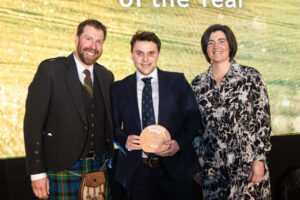
Young Agronomist of the Year
It was working with the family farm agronomist that ignited winner Ben Allard’s interest in agronomy. A passion for crop production led to an agronomist and rural consultancy role with Pearce Seeds.
Ben is committed to regenerative farming methods, ensuring that his clients grow and raise their crops sustainably, but also recognises that no farm is alike and there has to be a sense of realism to what can be achieved.
He advises on environmental schemes, capital grants and Sustainable Farming Incentive, guiding clients towards building more sustainable businesses by integrating cropping and environmental strategies.
He is proud of his drive to agronomic strategies that cut carbon footprints while enhancing biodiversity. Indeed, this is to be the subject of a documentary featuring him and one of his clients, plus others who share the same aims.
In 2020, he was awarded funding and a scholarship for his work with near-infrared spectroscopy sensors, exploring their potential to detect plant diseases in the early latent stages, well before visible symptoms appear.
At just 26, it is some record and it is no surprise that he has been quick to see the opportunities presented by the latest technological advancements to enhance his role as an agronomist.
He is also prepared to explore new ideas, such as silicone as a deterrent against cabbage stem flea beetle in oilseed rape.

Young Farmer of the Year – Sponsored by Cefetra
Kyle Catlin took home the Young Farmer of the Year award. Not from a farming background, Kyle’s introduction to agriculture began aged 13. He would cycle eight miles before school and at weekends to help out at a local dairy farm.
Fast-forward another 13 years and he now has a 200-head commercial sheep flock and additional small flocks of native rare-breed sheep and pedigree Hereford cattle.
Following a foundation degree at Shuttleworth College, he established himself as a small-scale contract labourer for farms and smallholdings. Working on a variety of farms, including a vineyard, has expanded his knowledge significantly. He has future ambitions to establish a farming business that is profitable as well as sustainable.
For the moment, he is helping others achieve that. For example, he implemented cover crop grazing to replenish soil organic matter for an arable farm customer, which also provides a respite for the grassland.
Establishing native breeds such as Dorset Downs and pedigree Herefords also helps cut soil compaction, as they are typically lighter than the continentals.
Once a farm business tenancy is secured, the aim is to transition to a more regenerative system by using livestock in the arable rotation and mixed farming methods. The integration of livestock should cut the reliance on synthetic fertilisers. By combining conventional and traditional methods, he believes a sustainable farming business can be achieved.
